Press conference concept Jedermann 2024
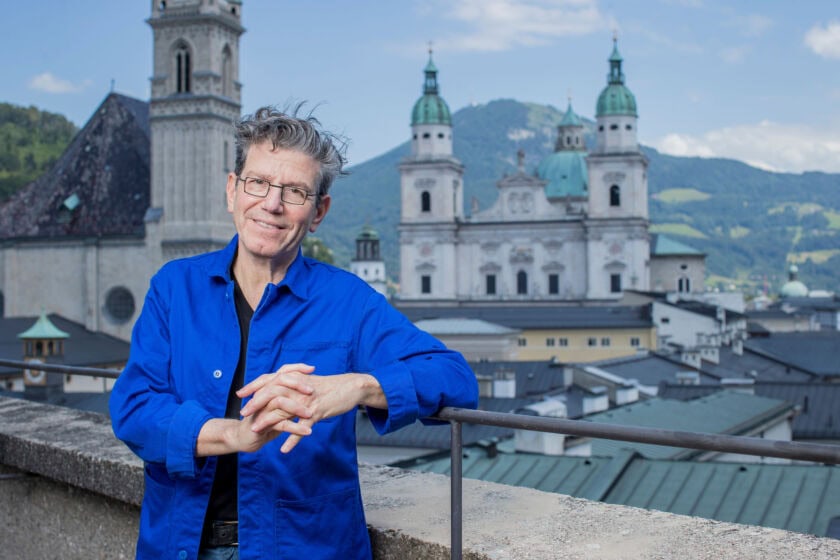
The renowned director Robert Carsen talks about his work on the production of "Jedermann ". He describes his thorough research into the timeless play and the creative process of staging it. He also provides insights into his collaboration with the actors during rehearsals. Both his expertise and his passion for the theater shine through.
Did you ever expect to be directing this play at the Salzburg Festival?
Never in my wildest dreams – but I’m thrilled to be doing so. When Markus Hinterhäuser asked if I would like to direct Jedermann, I was astonished that he had remembered the long and intense conversation we had had several years before on the subject of Hugo von Hofmannsthal. I have loved Hofmannsthal’s work since I first encountered it, and I have directed five of the six operas he wrote with Richard Strauss. I have also lived for a long time with the three-volume works of Hofmannsthal in English translation – although, interestingly, Jedermann is not in it! I was also familiar with the English medieval morality play Everyman, having studied it at drama school.
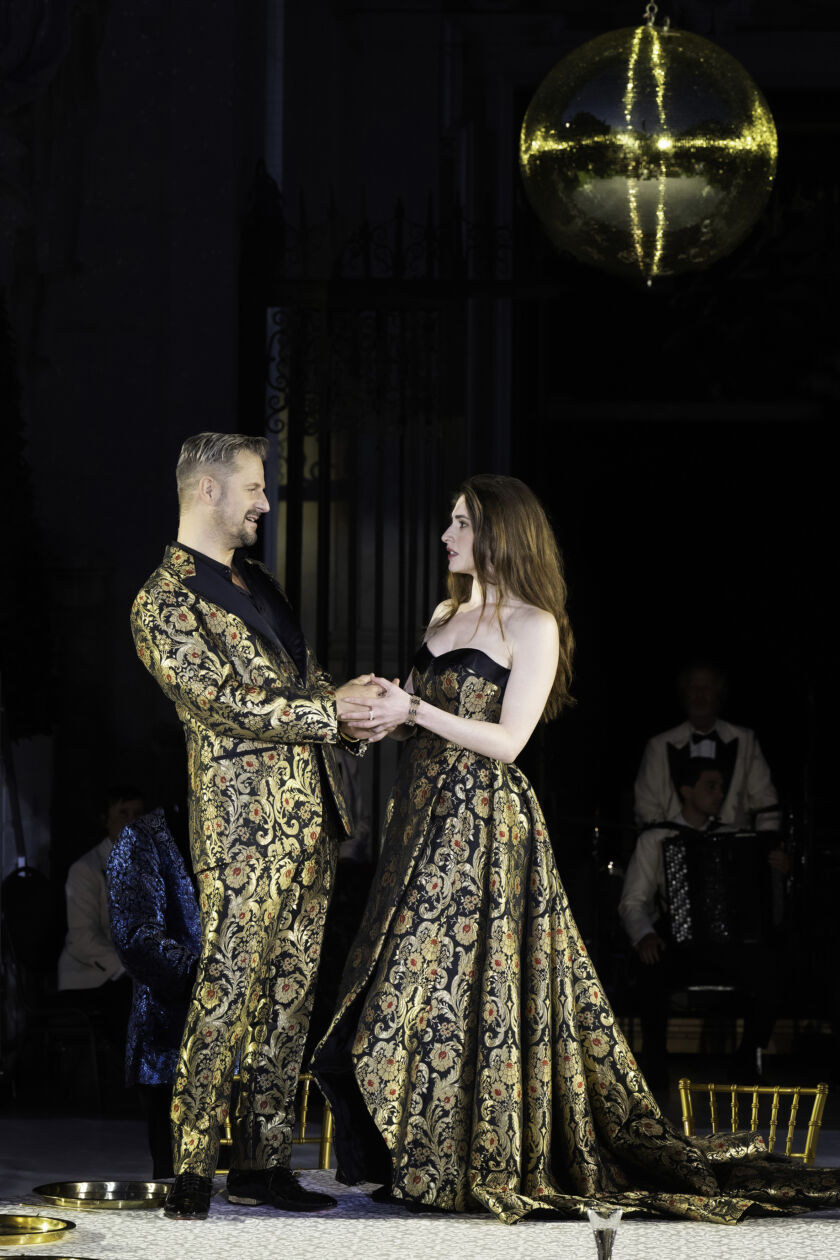
As a Hofmannsthal fan, what would you say are his most appealing qualities as a writer?
His writing is so very rich in meaning, symbols and intent. But in addition to that, there is always much more to be discovered, resonating within the text. Hofmannsthal had a unique ability to tap into a thematic vein and let his reader sense riches beneath the surface. It’s like drilling for water: a spring shoots up, but that spring is supplied by the unseen river flowing underneath. As well as being an extremely refined, sophisticated and gifted writer, Hofmannsthal had a constant awareness of the political, social and cultural Zeitgeist. He suffered a sense of loss – as so many of his contemporaries did – after the demise of the Austrian Empire, but I think Hofmannsthal also saw that conflict coming. He had a razor-sharp eye on many levels. His society’s obsession with money was a recurrent preoccupation for him. He wrote Jedermann, giving it the subtitle ‘The play of the rich man’s death’, out of his concern about the growth of materialism and a corresponding loss in spiritual values. This concern reached beyond Jedermann: Act II of Der Rosenkavalier (which premiered in the same year as Jedermann), and the 1916 version of Ariadne auf Naxos are both set in the houses of the wealthiest men in Vienna – both clearly nouveaux riches. There’s a line in Act I of Der Rosenkavalier that is often overlooked, in which Baron Ochs explains to the Marschallin that his intended bride’s father, the newly
ennobled Baron von Faninal, made his vast fortune by supplying the army in the Netherlands. Even in 1910/11 Hofmannsthal could see war coming, which is why in both productions of Der Rosenkavalier that I have directed (including the first one here in Salzburg in 2004), I set the work in 1911 and decided to make it very clear that von Faninal was an arms dealer.
So, what did you make of Jedermann when you began to study it?
Jedermann is a very particular text which is not representative of Hofmannsthal’s writing in general. It is made even more particular, peculiar even – but in a good way – by the fact that Hofmannsthal wanted to refer to the original medieval morality play through both the theatrical and textual languages.
The theme of the play, death, affects and unites us all, because every single one of us is going to die. And while the fact of our deaths clearly defines our lives, it is also the single most difficult thing for us to accept, especially here in the West. Most of us seem to have been programmed in our DNA to not be completely able to conceive of or believe in our own deaths: death is what happens to other people. Jedermann deals with the inevitability of death, but also its unexpectedness. And that is why the theme of death extends most importantly into a meditation on how we ought to live our lives.
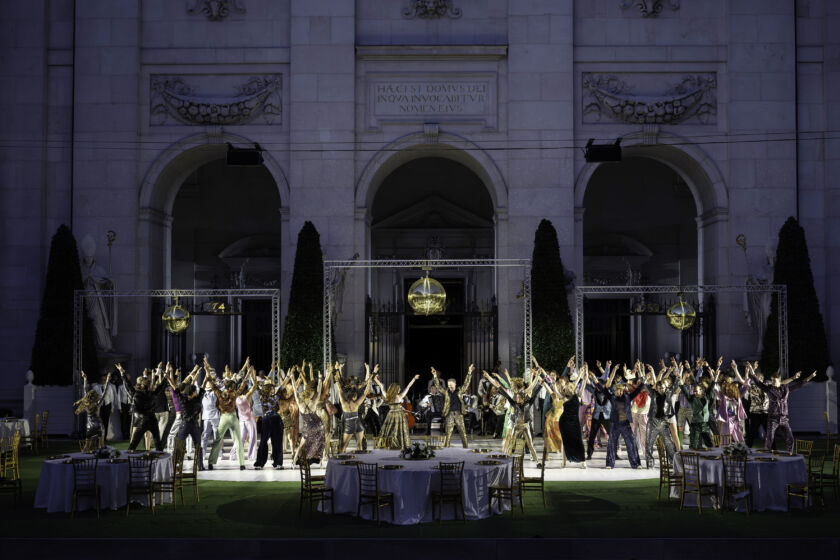
These performances in Salzburg are full of ghosts. All the actors who’ve said the same lines in the same place…
There was an enormous amount to study and to comprehend before I felt able to even begin to conceive a staging: I had to read and re-read the play many, many times – very often reading it out loud – in order to understand how the many separate scenes make a cohesive whole. I think Hofmannsthal wrote a ‘mystery play’ which contains a lot of mysteries, which each production attempts to unlock. And then there is the fact that it was the great Max Reinhardt, one of the founders of the Salzburg Festival, who directed the first production. We even have his Regiebuch, with all his staging indications. That raises the level of the bar even higher. I was also intrigued by the fact that the characters in this play, some of whom are real and some of whom are allegorical, can be presented in so many different ways. I mean, how should we present Gott (God), Tod (Death), Mammon, Werke (Good Deeds) and Glaube (Faith)? And what do their scenes really mean? So, in making casting choices for Jedermann, especially for the allegorical characters, you are of course already having to decide how you intend to interpret the play.
If you were able to play just one of those characters, which one would you choose?
I am extremely happy with the multiple role that I have been given: director, co-stage designer and co-lighting designer! It’s challenging and exciting, sometimes exhausting, but always extremely fulfilling.
The other characters would also be marvellous to play, each for completely different reasons. It’s true that the only one who undergoes major change (both psychological and spiritual), is Jedermann (Everyman) himself, and so I think it’s essential that the audience identifies with him. For the longest time Jedermann doesn’t understand what the audience understands: how misplaced his values are. It is only in the powerful scene with Werke, after he has lost everything, that Jedermann begins to have an inkling of what a meaningful life could be. This is further developed in the scene with Glaube. Jedermann’s shift from a materialistic, unthinking hedonist to a fully aware, spiritual being is something that should be moving and cathartic for the audience, both as individuals and as a collective. And that is one of the main reasons that the piece is so powerful.
It’s interesting, because quite a few people, from Arthur Schnitzler and Karl Kraus onwards, have said that it is not a very good play at all. Do you think that this has something to do with the fact that, as you said earlier, the play contains so many mysteries?
When writing something, an author rarely has an idea of how it’s going to be received or resonate. When Jedermann was first performed in Berlin at the Circus Schumann in December 1911, Hofmannsthal could never have imagined that it would be staged again nine years later as a stopgap to open the first Salzburg Festival, simply because he hadn’t finished Das Salzburger große Welttheater. Or that this stopgap would become something so significant that it would be performed annually over such a long period of time. The play is a one-off. When studying it, I was surprised to see how faithful Hofmannsthal often is to the old English Everyman, even using some excerpts in their entirety. Elsewhere, he has developed the play in an entirely different way. As we know, Hofmannsthal’s reason for writing this play was his concern about the rise of materialism, which is why he introduced the character of Mammon. He also carefully placed a number of key moments in the play where money and wealth are discussed: Jedermann’s scenes with the Armer Nachbar (Poor Neighbour), with the Guter Gesell (Best Friend), with the Schuldknecht (Debtor), his monologues and even the scene with his Mother. And then there is the crucial scene before Mammon appears, when Jedermann decides that if no one will accompany him on his journey to death, then he will take his money with him for company.
In fact, thinking about it now, I am convinced it is a very, very good play indeed, possibly even a great one – whatever that may mean.
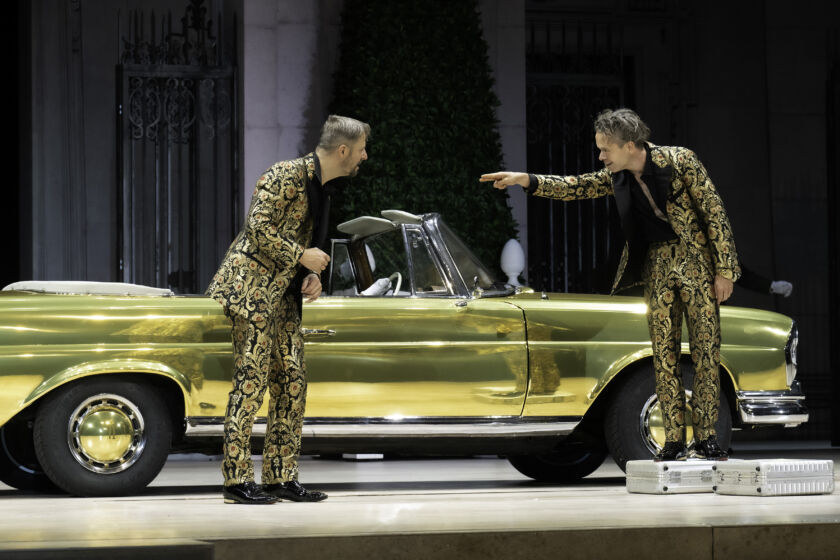
As well as Mammon, another character that Hofmannsthal invented who isn’t in the medieval English Everyman is the Teufel (Devil). Why do you think he felt he needed to include him?
I think what is terrific about that scene is that this Devil gives clear voice to the doubts anyone who is sceptical about the concept of Christian redemption might have: that through repentance one’s sins can be forgiven. Hofmannsthal does an absolutely brilliant thing, turning everything upside down, so that it is the Devil who says in essence, ‘How can someone as honest and hard-working as me survive in a dishonest world full of cheats?’ And in a strange way this scene allows us to accept Jedermann’s final transfiguration, whatever our religious persuasion may be, simply because the objections to it have been expounded so very clearly and carefully through the mouthpiece of this Devil. The Devil equates the way Jedermann has lived his life to building an edifice of sin, and wants to claim his soul ‘für uns’. I think it’s important to remember that the Devil in Jedermann is only a devil – he is not Satan. When I studied the text more closely, I noticed that Jedermann’s best friend, his Guter Gesell, is always encouraging him in
his selfish, bad behaviour. Furthermore, the Guter Gesell mentions hell several times, even swearing by God’s death. This led me to think that these two parts could, in fact, effectively be the same character and that Jedermann has a devil by his side right from the start. I hope that the audience will be able to enjoy that. In a similar way, the Armer Nachbar (whom we present as a beggar) can be imagined also as Werke, someone with direct experience of Jedermann’s lack of charity. This dual role opposes the one of the Guter Gesell/Teufel. I see them as balanced opposites.
The project that both Reinhardt and Hofmannsthal had worked on in the same Berlin venue immediately before Jedermann was first performed was Oedipus. Do you think that Jedermann shares some of the features of a Greek tragedy?
Hofmannsthal had seen several plays by Aeschylus in the Teatro Greco in Syracuse – the same theatre where I was fortunate enough to direct Oedipus Rex two years ago, and where we are preparing the rest of the Oedipus trilogy. Hofmannsthal refers to the powerful impression the theatre had on him in one of his essays. I think seeing those plays in that setting did inspire him to try to find a subject that could deal with life and death in a way similar to how Greek tragedy deals with them, clearly operating on two different levels, the earthly and the numinous.
In Jedermann, a messenger is sent by God to visit mankind. Though, compared with Pentheus in The Bacchae, Jedermann gets off quite lightly.
In this case I think Hofmannsthal is not only writing the play as a warning; he also wants to celebrate the idea that there is something beyond human life. He works through what happens when a man who does not have any values beyond material ones comes to realize how misguided he has been, but only when he is about to die, and when it’s too late to begin again. This is where the whole notion of repentance, forgiveness and redemption comes in, which in this particular instance is explored through the Christian Catholic tradition. However, we know from Hofmannsthal’s 1912 essay ‘Das alte Spiel von Jedermann’ that he did not mean this play to work only for people who believed in the tenets of the Christian faith. His aim was more universal.
My instinct is that Jedermann is more about how to live than how to die. Jedermann’s motto may be carpe diem, but if you live in that way only, don’t you risk doing so at the expense of other people – even if you are the one paying for everything? I think the play is also about the fact that all of us need to help each other, that we’re all part of one larger entity. The Schuldknechts Weib (Debtor’s Wife) says ‘Geld ist ein Pfennig, den eins leiht / Dem Nächsten um Gottes Barmherzigkeit’ [Money is a token one person lends another for the sake of God’s mercy.]. You can’t take it with you, but what can you do with it while it’s yours? The act of theatre remains one of the few acts of sharing we have. The actors and the audience collectively make that experience happen, and every performance is unique. We experience it together, and it doesn’t matter that the individual audience members don’t know each other. I hope the play reminds us that we are all part of the same whole, that we have to attempt to find a way to live together and to share what we have. This play, at a time like ours when the rich are so staggeringly rich and the poor are so poor, seems to me to be more relevant than ever.
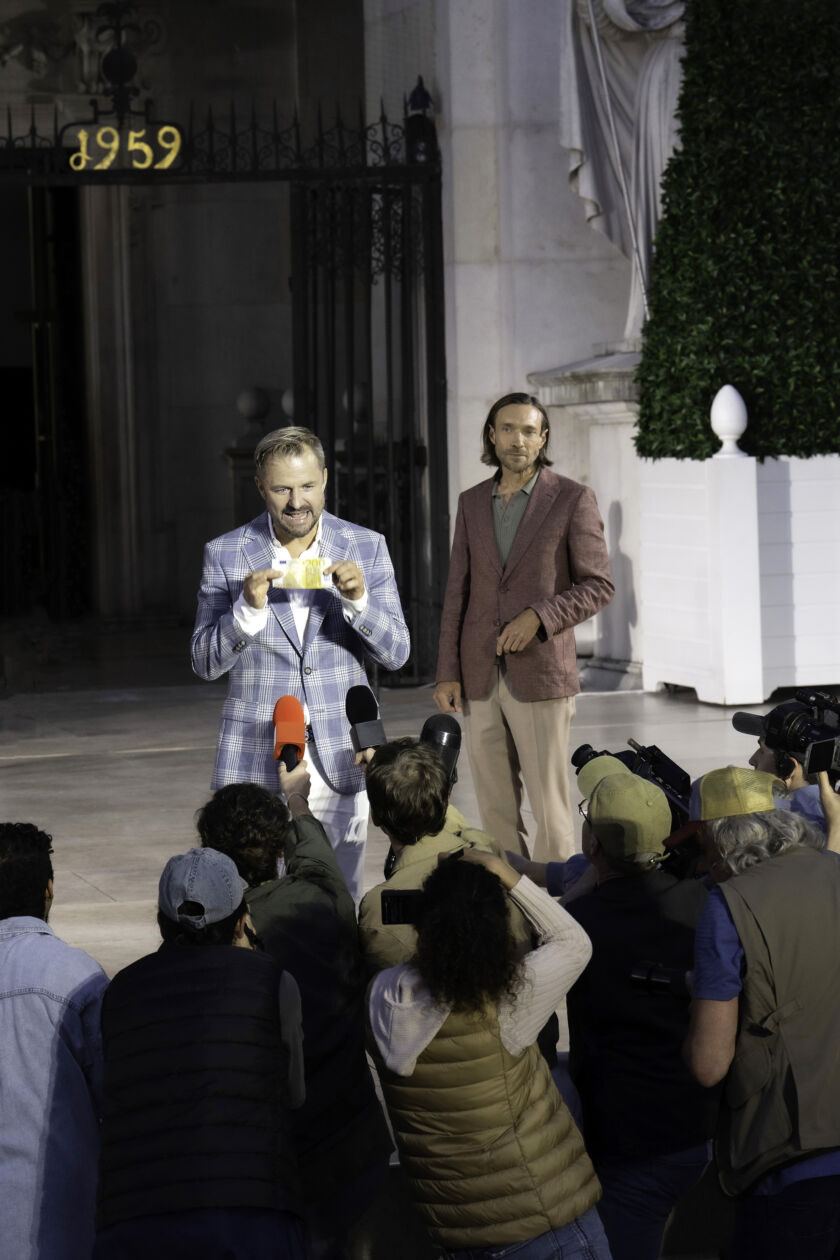
And the performances are (hopefully) all outdoors, directly in front of the Cathedral…
The Cathedral (Dom) is an astonishingly powerful building. The proximity of the stage to the audience means that there remains an intimacy, in spite of the vast scale. So together with my co-designer, Luis Carvalho, we decided to use the Dom as our set, rather than build another set in front of it. It’s as if the Dom itself is another character. In this way we hope to make the stage as large as possible and to attempt to use the building itself to match the scale of the spiritual and temporal power which Hofmannsthal explores in the play.
Can you remember when you first became aware of death?
My grandfather died the year I was born. When my grandmother died, I was only five years old, and too young to go to her funeral. But I remember my mother’s inexplicable sadness, and, because of it, a sudden distance and separation from me, which I didn’t understand at the time, and which upset me greatly. I have discovered that when people who are very close to me die, they somehow become more present than they were before. I tend to think of them more often, I think about what they said, and their words become part of my vocabulary, part of my thinking process. I don’t remove them from my address book. They’re all still there with me, somehow.
If it were possible, would you want to live forever?
Paradoxically, living forever means fixing one’s life at one moment in time, freezing it. If that were to happen, there would be no development, either individual or collective. And at which point in one’s life would one fix that moment of forever? If we want to embrace the things that life offers, then I think we are obliged to embrace death, because whether we like it or not, it is clearly part of life. As Erda says in Das Rheingold: ‘Alles, was ist, endet’ and the sooner we can really accept that the better and more fulfilling our lives can be.
One last question: Is there anyone who’s passed away whom you particularly wish could have been able to see this show?
Well, there are many in fact. But your question makes me think above all of one person: Hugues Gall, who died a few weeks ago. He took a risk and gave me my first directing job when he was intendant of the Geneva Opera. It was Boito’s Mefistofele, which, curiously, is related thematically to Jedermann. After that, I directed a number of other productions for him in Geneva, and more still later on when he became intendant of the Paris Opera. In March he presented me with the First Grand Prix de l’Académie des beaux-arts in Paris. At the party afterwards I told him about Jedermann and he said: ‘I’m going to come and see that.’ It doesn’t seem to have worked out that way, but who knows, he may in fact have the best seat in the house…
Robert Carsen was talking to David Tushingham
